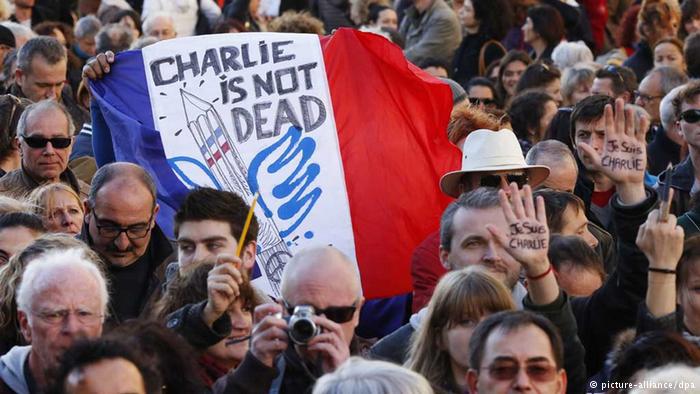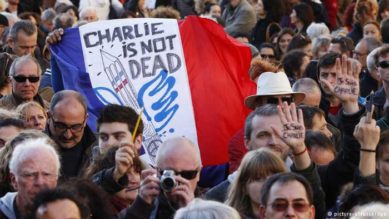Global Issues
Anti-terrorism war in France: Any lessons for Nigeria? -By Ayo Olukotun

Before considering the lessons that Nigeria can take away from last week’s war against terror in France and Sunday’s magnificent anti-terror solidarity march in Paris, let us whet our appetite with two short takes. The first one is taken from literary theorist and Harvard Professor, Biodun Jeyifo, who narrated recently what he called a popular joke making the rounds. Not having heard this joke myself made it and the accompanying comment by the scholar even more striking. To quote Jeyifo: “At the very earliest indication that President Goodluck Jonathan and the Peoples Democratic Party are losing the presidential contest, say a few hours into the vote count, many private jets will fly out of the country as the kleptocrats and ‘lootocrats’ close to Jonathan and the PDP flee the country in terror of the punitive measures they expect from the All Progressives Congress’ Muhammadu Buhari”. As equally engrossing as Jeyifo’s re-telling of the joke is the scholar’s own remark which goes thus: “To this, I ask the following questions; what of the kleptocrats and ‘lootocrats’ close to the APC and the other ruling parties; will they also take off in their private jets or will they feel secure in the knowledge that only miscreants and felons close to the PDP will face the day of reckoning?”
Jeyifo’s pertinent questions speak to the complicated and messy character of the war on corruption in a terrain in which, to employ a verse from the Holy Book; “All have sinned and come short of the glory of God”. What then do we do? The slippery context in which even the watchers have to be watched, paraphrasing the title of Yinka Odumakin’s new book on Olusegun Obasanjo, suggests that irrespective of who wins next month’s presidential election, the civil society cannot afford to lower its guards. Matters would have been more straightforward if all the angels were on the one side of the divide and the devils on the other side. But alas, there is no such luck in this business.
My second take begins with the question, when was the last time that you received a call from a Nigerian organisation, public or private, that your cheque for services performed is ready and you should come and pick it up? Well, that was a pleasant surprise this writer got from the Managing Director of the University of Ibadan Bookshop whom I have never met. In what appears to be a re-organised setting, I received a call earlier this week to come and pick up my cheque which is payment for copies of one of my books which was sold by the bookshop. It looks trivial; but in a country in which dysfunction has become the first law of organisational culture, this was a most refreshing departure. The moral; Nigeria can work if many more leaders in the various sectors of our national life insist on doing things properly.
Now to the main comment: The world is still very much in the wake of events of the past week in France where 17 people including 10 of the most influential satirical journalists lost their lives in an outbreak of terror and the determined war against it by the French authorities. The saga had to make headline news across the globe to such an extent that Archbishop Ignatius Kaigama of the Catholic Church in Jos wondered aloud why Nigeria’s more protracted and far bloodier terror escapade has received far less attention. Speaking on the BBC World Service, the priest observed that, “we need that spirit to be spread around not just when it happens in Europe but when it happens in Nigeria, Niger, Cameroon and many poor countries that we mobilise our international resources to confront the people who bring sadness to many families”. Obviously, Kaigma’s pious wish is not about to be realised in a hurry and in a world in which a country’s place in the global pecking order determines the attention it gets not just from the global media but from the international community. Don’t forget that Ebola only became a serious international issue when it surfaced in the United States and in handful of European countries. Why bother so much, so the reasoning goes, about the “inevitable insurgencies” that go on in poorer countries when there are presumably bigger issues in the civilised world to worry about?
The situation in France would seem to contradict that mindset to the extent that immigrants from North Africa and elsewhere as well as a distinct and growing Muslim community have become regular features in many parts of Europe. In this sense, terror and Islamic radicalism have acquired a global geography. The sidelining of Nigeria’s terror war should teach the country to take its future in its own hands instead of expecting salvation from the world which is pre-occupied with its own problems. Until Nigeria breaks into the ranks of influential countries, its triumphs and tragedies, with a few exceptions such as the Chibok saga will very much remain its own headaches. Nigeria cuts a pitiable figure each time it expects that the world will stand to attention beyond consoling speeches as a result of its travails.
Another lesson we can take home from the French encounter with terrorists is the decisiveness and dispatch with which the French Government acted, deploying on one occasion over 10 thousand troops to guard sensitive parts as the battle raged. True, the Nigerian terrain featuring porous borders and stretches of waste land such as the Sambisa Forest is a military strategist’s nightmare. Nonetheless, it must now be reckoned that the government’s initial strategy of downplaying the insurgency and settling for the winning of the hearts and minds rather than the overwhelming, militarily, of the insurgents would appear to be a mistake. As illustrated by last year’s ruse of a ceasefire employed by the insurgents to sell a dummy in order to buy time and re-group, soft approaches, even if well intentioned, can be counter-productive.
There is also the issue of the rare and spectacular unity displayed by the French leaders (across parties), and people in rising up against terror. By contrast, the divisiveness of the Nigerian political class, even in the face of existential challenges, has been much lamented. Opposition leaders seem to gloat when the Nigerian military suffers reverses as this is readily taken as one more evidence of an incompetent government. It is interesting that despite the low approval rating of President Francois Hollande, the endangering of the nation by terrorists was seen as a mortal danger to the Republic rather than an event from which to scoop electoral gains.
The need arises also to talk about the status of our military institution and its under-equipping. As the ongoing presidential campaigns have revealed, successive governments including the current one have either underfunded the military or have not been too careful in taking a close look at the spending of defence budgets. One can only hope that our current challenges will drive home the lesson that it cannot be business as usual. Whoever wins next month’s presidential election, the first order of business must be to, as much as possible, reverse institutional decay while seeking to control its consequences in the short term.



















